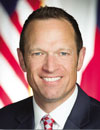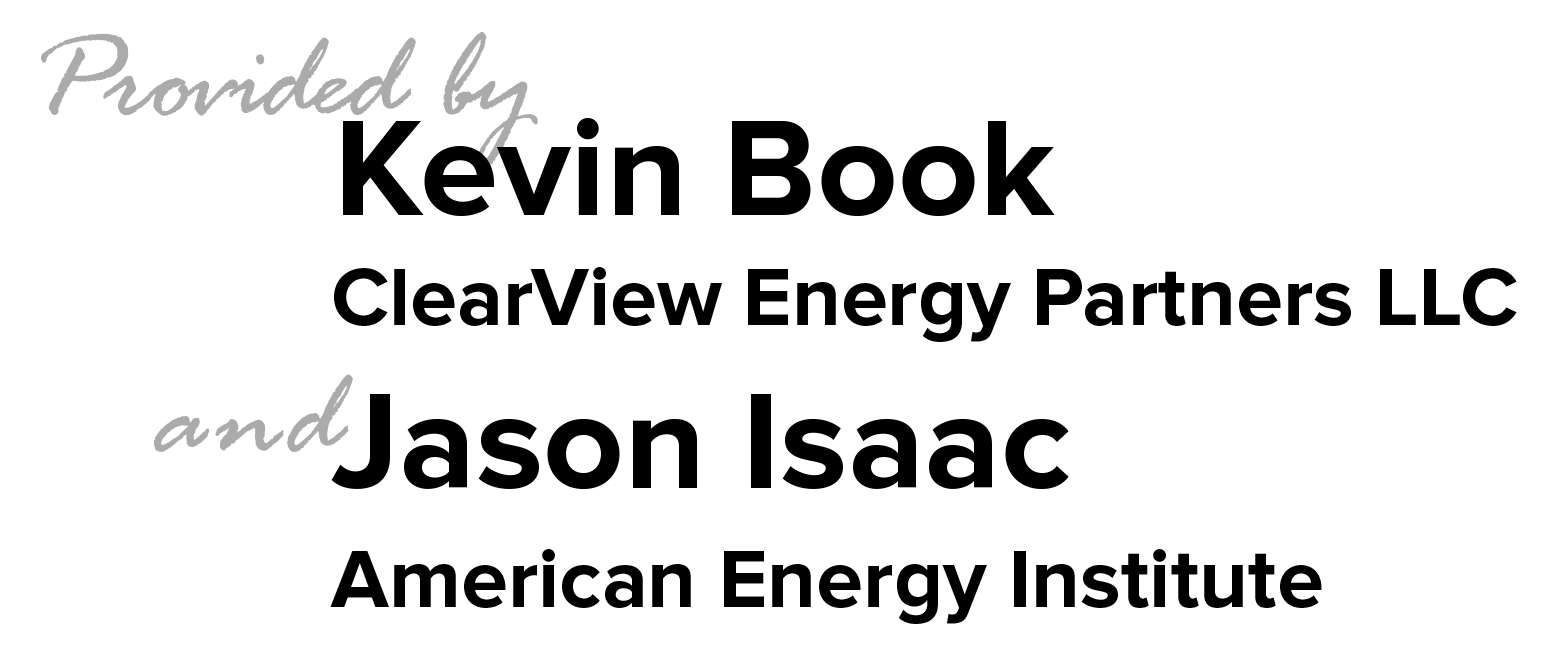
Election 2024: Energy Industry Analysis
Provided by Kevin Book and Jason Isaac
Much has changed over the past four years. Regardless of one’s political persuasion, there is simply no denying that the world in the fall of 2024 looks like a very different environment than it did in November 2020, when the United States and every other country around the globe was still emerging from the pandemic lockdowns.
The question voters have to settle on Nov. 5 is the same one Ronald Reagan famously posed to the American people from a televised debate stage in 1980: “Are you better off today than you were four years ago?”
Of course, in that election, Reagan scored a resounding victory over incumbent Jimmy Carter. Which way will voters go in 2024 in an election in which a former president out of office for one term returns to challenge the incumbent party’s candidate?
The story reads like an improbable movie script. Yet here we are, Democrat Kamala Harris versus Republican Donald J. Trump.
Since the last presidential election, Americans have felt the sting of inflationary cost pressures, ongoing high-stakes conflicts have broken out in Eastern Europe and the Middle East, and issues such as illegal immigration and high interest rates have replaced the pandemic and health care as topics of greatest concern to voters.
Energy, while not generally atop the list of most-cited issues at stake this fall, is nevertheless a perennial priority for U.S. citizens from one election cycle to the next. It is also an issue that in recent years has tended to define stark differences between the two major political parties and their chosen candidates.
As a service to our readers, The American Oil & Gas Reporter invited experts in political and economic policy analysis to share insights into the presidential candidates’ perspectives on numerous topics relevant to domestic oil and gas producers, ranging from federal agency regulatory matters to taxation policies and U.S. energy exports.
This special Q&A “debate” features Kevin Book, director of research at ClearView Energy Partners LLC, and Jason Isaac, chief executive officer of the American Energy Institute (AEI). While neither Book nor Isaac directly represent the Democratic nor Republican party presidential campaigns, both provide expert responses on how a Harris versus Trump administration can be expected to deal with of a range of issues of vital importance to domestic oil and gas producers and operators.
Q: Policymakers from both parties and across the ideological spectrum tend to agree that access to clean, abundant and affordable energy is critical to the U.S. economy and national security. However, that agreement often dissolves when the conversation turns to specific ways of promoting energy access. How would you characterize the comprehensive approach a (Harris/Trump) administration would take to energy policy?
 ClearView: Our firm does not speak for the Harris-Walz campaign, and the KamalaHarris.com website still contains relatively few policy details. Accordingly, these answers reflect our best assessments as of Sept. 29.
ClearView: Our firm does not speak for the Harris-Walz campaign, and the KamalaHarris.com website still contains relatively few policy details. Accordingly, these answers reflect our best assessments as of Sept. 29.
In our view, the organizing principle of the Harris campaign, like the Biden administration before it, looks to be one of clean industrial policy—a government-orchestrated transition—with strong secondary support for labor constituencies and environmental justice communities. Yet Harris also appears to appreciate that high prices can undercut voter support for “green” energy, as well as incumbents’ re-election prospects (like President Biden, Harris would be a first-term president with reasons to be wary of voters’ pump price woes). Thus, she might continue a pragmatic if not enthusiastic posture vis-à-vis domestic oil and gas production; call it “all-of-the-above . . . for now” acceptance.
On that note, the vice president may pitch herself as a change agent, but for policy and regulatory purposes, we think of her as the continuity candidate. Modern presidents generally need two terms to establish durable policy legacies because of the years required to propose a rule, take comments on it and finalize it, followed by years more to defend that rule against legal challenges. Whereas Trump could walk away from Biden’s unfinished rules and pending legal defenses (and rewrite finished ones), Harris would be positioned to preserve and expand upon those actions.
 American Energy Institue (AEI): The contrast couldn’t be clearer. President Trump’s first four years were marked by pro-energy, pro-business policies that allowed businesses to compete on a level playing field and, as a result, lowered pump prices, kept the cost of living low and improved the U.S. economy. These policies were particularly beneficial for low- and middle-income Americans who spend a higher percentage of their incomes on energy and transportation.
American Energy Institue (AEI): The contrast couldn’t be clearer. President Trump’s first four years were marked by pro-energy, pro-business policies that allowed businesses to compete on a level playing field and, as a result, lowered pump prices, kept the cost of living low and improved the U.S. economy. These policies were particularly beneficial for low- and middle-income Americans who spend a higher percentage of their incomes on energy and transportation.
By contrast, the Biden-Harris administration started with an immediate clampdown on energy producers, industry and vehicles, with incredibly burdensome financial and environmental regulations that shot prices through the roof without any meaningful environmental benefit. The Biden-Harris administration also leveraged all of its political capital to force new laws through Congress to create massive handouts to reward their political allies and, on the backs of hardworking taxpayers, to underwrite lousy investments in extremely costly and uncompetitive energy technologies.
Ironically, the policies of the Biden-Harris administration have significantly increased both global greenhouse gas emissions and emissions of harmful pollutants by increasing costs domestically to both business and consumers, and shifting investment, production and economic growth to countries such as China and India, while increasing U.S. dependence on imported goods.
All President Trump needs to do is point Americans back to his time in the White House. It will be difficult in this economy for even the most ardent anti-Trumpers to resist the allure of paying $1.99 for gasoline again. President Trump should also methodically unwind the massive increase in bureaucracy, inefficiency and dozens of unlawful regulations from the Biden-Harris administration.
Read the entire Election 2024 report in the magazine e-Edition!

KEVIN BOOK is co-founder, head of research, and geopolitics and fossil energy policy lead at ClearView Energy Partners LLC, an independent firm in Washington that serves institutional investors and corporate strategists. He is also a nonresident senior adviser in the Energy Security and Climate Change Program at the Center for Strategic and International Studies; a member of the Council on Foreign Relations; and a member of the National Petroleum Council, where he most recently served as an at-large member of its Co-Chairs Coordinating Committee. Book appears frequently in print and broadcast media, contributes to policy forums convened by government and private organizations, and meets with top Washington and global decision-makers. He also has testified before several House and Senate committees. Prior to co-founding ClearView, Book worked as a senior energy analyst for a national investment bank. He holds an M.A. in law and diplomacy from the Fletcher School of Law and Diplomacy and a B.A. in economics and English from Tufts University.

JASON ISAAC is founder and chief executive officer of the American Energy Institute and a distinguished fellow for Life:Powered at the Texas Public Policy Foundation. Prior to starting the American Energy Institute, Isaac, a fourth-generation native Texan, was elected four times as the state representative for Hays and Blanco counties in the Texas Hill Country. He served on the Energy Resources and Environmental Regulation committees, among others. During his eight years of service, he successfully passed legislation to reduce taxes, strengthen election integrity, improve public education, preserve Second Amendment rights, protect local groundwater and protect private property rights. Isaac has appeared live on Fox News, Fox Business, CNN and other national news shows. His commentaries have been published in “Fox Business,” “The Hill,” “The Washington Examiner,” “The Daily Caller” and other publications. He is a graduate of Stephen F. Austin State University.
For other great articles about exploration, drilling, completions and production, subscribe to The American Oil & Gas Reporter and bookmark www.aogr.com.
















